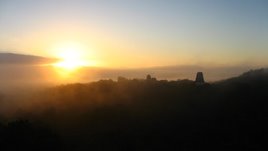Just went to Mali. It was great, really touristy though. Too much so at some points I thought. But the people were extremely friendly. I went to Djenné, the small historic town of yore, a town which rivaled the power of Timbuktu back in the day. The marché, which happens every Monday, transpires in front of the largest mudbrick building in the world, a Sudanese-style mosque. Heard I had to go check it out.

So, Whitney, Michael, Danielle and I left Ouahigouya early Saturday so we could get to Djenné on Sunday. Our transport out of Ouahigouya was ridiculous, delayed for several hours, then the driver tried to avoid the toll booth. Well, the police caught him. After and hour of wrangling with the cops (who threatened several men because they did not have IDs), we took off north. The ride wasn't too bad, not too hot in the cramped taxi brousse. When we got to the poste frontière (border post), the men who did not have IDs simply walked past the guard house where the border/customs officer resides. I found that interesting. After a quick friendly exchange and passport stamping, we were on our way out of Burkina. The men who skipped the border post subsequently got back on.
About 20 minutes later, the men told the chauffeur to stop. This is good, they said. Then they got out and went into the bush. My other three companions didn't understand what was going on. I told them that the men didn't have their IDs, so they were illegally crossing the border via the bush. First time I had seen any of that, somewhat interesting. We crossed into Mali at the frontier station easily enough, the customs officer was very friendly and spoke English quite well. We only payed 15,000 francs. Malian embassies have raised the price of visas for Americans because of how much it costs Malians to get to the United States, one of those tic-for-tac, we're going to make it equal measures. Makes no sense from a tourism standpoint, plenty of sense from an equal footing standpoint. Luckily, we got through without having to pay the exorbitant cost. We all piled back in to the taxi brousse, the lone baby screaming, and a minute later there were the two or three men who crossed the frontier illegally, nonchalantly standing on the side of the road.

We got into the Koro, Mali customs spot and the douane (customs) officers led a man away. Maybe he was smuggling something, hmm. We then found our way to the taxi brousse gare and got tickets for Mopti direct. We sat down, had some omelette sandwiches and a little rice, then took off, nightfall almost completely enveloping us. At this point, Mali seemed a lot like Burkina. Koro had electricity and the roads were good, same Sahelian-like countryside. We got into Bankass around 7 pm, no lights in the skies except for the twinkle of stars and a faint crescent of moon. The driver then said it was too late to go on, the two roads to Bandiagara may be cut and bandits could have their way with us. We all relented and agreed to leave at 6 the next morning.
We started up the road towards the Falaise Dogon, better known as Dogon Country. As we approached, it looked like big, boring hills. As we got nearer, it became an astonishing rock escarpment, one of the most beautiful things I had seen in West Africa. The paved road led us on a meandering path in an other worldly, absolutely gorgeous rocky terrain, complete with blisters of rock bursting from other rocks, layered strata of salt and pepper gleaming just a little in the new morning light. Dogon villages, not made of mud but of rocks, dotting the road, the Dogon themselves working in their gardens, tending to the onions and cabbages. Neem and baobab trees dotting the gentle golden landscape, still more rock escarpments rearing their heads.
Bandiagara was next and we just passed through. A beautiful town, lots of trees, a tourist center. Lots of 4x4s, white Land Rovers, tour vehicles. We got out of town and still, more rocks, huge glowing silver escarpments shooting into the sky. I was stunned by the beauty and remarked to myself that I had to come back. I thought myself foolish because I had told a plethora of people that if I didn't do Dogon, I wouldn't be that sad. Well, it's too beautiful to be skipped, for all of you wishing to trip to Mali or anywhere close to Mali in West Africa.
We got to Mopti and tooled about for an hour at the taxi brousse gare, just waiting for enough people to show up so we could fill a 9 person vehicle. We ended up getting in the car with a French couple (the man was nice but his significant other seemed perturbed) and a very nice Polish couple. Our driver was hilarious, his hair something funny, resembling Homey the Clown. He drove like lightning and we got to the Djenné carrefour, or the intersection to Djenné off the Bamako-Mopti road. We paid a tourist tax of a 1000 francs and then Homey the Clown, still mimicking almost everything Whitney said, again drove quickly to the ferry crossing. The plain was a marsh, real close to the Bani River. Djenné, sitting on an island in the Bani River connected by a causeway, rose up from the island, the brown mud and concrete architecture greeting us. Malians anticipating the tourists lined the causeway, frowning in the typical fashion, except the little children, usually all smiles and waving.

The streets of Djenné were quaint, little alleys everywhere. The architecture was so different. We finally got to the transport hub of Djenné, an area to the left side of the mosque. What a neat place. A wall with multiple gates surrounding the huge structure, wooden load-bearing members protruding nice and uniformly on all sides. I took a look and new it was gonna be cool. We stayed on the roof at Le Campement, the most touristy of Djenné's hotels. It was crowded with Austrians, French, German, Italian, Americans tourists. Cameras everywhere. We sat down, had a few beers, thought about what we were going to do for marché day. Went to a bogolan, or mud cloth, shop to check out what they had. Mud cloths are a very earthy form of Malian art, originally started in Djenné. I don't know exactly how they do it, but they use muds from different sources, which yield different colors, to create stirring scenes on cotton cloth.
We remained in Djenné for a few days. Some Malians offered to guide us, but the town itself was so small, plus we didn't want to pay. We took some shots of the mosque from the rooftop of several buildings, joining the flocks of Austrians and French among others. We watched a few Malians get into a street fight as we went inside one of the buildings to climb the stairs to the terrace. A guy who was trying to guide us said something to another Malian (apparently about his mother, eek!) They then resorted to violence. I no longer wanted to speak to that guide, now appearing a faux type. We met other guides who offered to take us up to Dogon Country, but we were going back through the western Burkinabé gate to spend some time in Bobo-Dioulasso, Burkina's second largest city.
I did have an encounter with a very cool Malian college student, he himself on vacation at home in Djenné from university in Bamako. We spoke about how Africa was getting along, he told me about Mali and the tourism there, told me about his sociology and language studies, told me how he hated math. His English was excellent. He also related to me, like many Burkinabé, that West Africans prefer Americans to the French. We spoke about cotton, where I mentioned US farm subsidies were hurting African farmers. But, surprisingly, he agreed with the stance of the US farmers. He put it to me like this: if your friend's beard is on fire, and so is your's, wouldn't you put your's out first? He was showing me he understood the protectionist stance that the American government takes with farm subsidies. I had met another African who was very well informed.
Mali was great, and the people so very friendly. I was somewhat impressed with infrastructure (roads and transport were pretty good) and also with the level of intelligence. Yaya, the student, told me there were multiple universities in Bamako. It just seemed a little more developed than Burkina. Maybe that's due to tourism. One thing I have to repeat: you can't skip Dogon Country, it's too damn beautiful. But the food and drink isn't as good as Togo or Ghana!



















